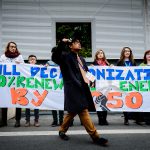With the Paris climate deal, the world has created the mother of all take-back schemes, writes Myles Allen, Professor of Geosystem Science at the University of Oxford. According to Allen, fossil fuel companies don’t necessarily have to stop producing CO2 – they just need to be required to ensure it doesn’t end up in the atmosphere. #takebackCO2 – start tweeting it now! Courtesy of The Conversation. … [Read more...]
COP21: a deal is in the making
As we enter the second week of the world’s make-or-break UN climate conference, the elements of a new global climate agreement are falling into place. It will provide energy companies the world over with the certainty of a long-term climate goal and of a push from governments to make them pay for their greenhouse gas emissions. But it will also recognise that the world has changed since the Kyoto Protocol and that emerging economies like China … [Read more...]
US desperately needs a national energy policy
The US - and indeed the world - is at a crossroads when it comes to the choice on how we want to provide energy services in the future, writes US energy expert Allan Hoffman. According to Hoffman, the US desperately needs a national energy policy that recognizes the importance of moving to a renewable energy future as quickly as possible. Without such a policy, economic growth, the environment and national security will suffer. … [Read more...]
The carbon capture conundrum: is CCS a climate saver? Or a dangerous distraction?
With fossil fuels expected to provide the bulk of the world’s primary energy needs for the foreseeable future – despite the rapid rise of renewables – carbon capture and storage (CCS) is seen by many as an essential technology if we are to keep global warming within the 2°C limit that scientists recommend. "For many industrial processes, it's the only thing we have." … [Read more...]
Why is CCS stuck in second gear? We need it to fight climate change
Although carbon capture and storage (CCS) is acknowledged by experts as a key technology to fight climate change, it is currently stuck in second gear, writes Howard J. Herzog is Senior Research Engineer at Massachusetts Institute of Technology (MIT). The reason, he says, is that there is no market for CCS at this moment. He calls on policymakers to set a carbon price that would generate demand for CCS. … [Read more...]
More coal plants are being cancelled than built
The global coal boom has started to slow, a new report says, as more plans for new power plants are now being shelved than completed. The number of cancelled coal projects across the world has outstripped those completed at a rate of two to one since 2010, according to Sierra Club and CoalSwarm - two campaign groups that have tracked the progress of 3,900 intended plants since 1 January 2010. Article by Sophie Yeo of The Carbon Brief. … [Read more...]
FutureGen’s demise: another blow to CCS
The demise of the much-touted FutureGen 2.0 carbon capture and storage (CCS) project in Illinois is another blow to CCS. Bob Burton, editor of CoalSwarm and Director of the Sunrise Project in Australia, argues that the fate of FutureGen symptomizes the intractable problems faced by CCS everywhere. In Europe, four large utilities - Vattenfall, RWE, EDF and Gas Natural Fenosa, dropped out of the CCS-organisation Zero Emission Platform (ZEP). … [Read more...]
The Energy Union: “a holistic approach to the energy transition”
The EU’s great new project of an “Energy Union” will represent “for the first time a holistic approach to how we need to achieve the energy transition,” said the man in charge, Commissioner Maroš Šefčovič, at a press conference in Brussels last week. His colleague, Climate and Energy Commissioner Miguel Arias Cañete, at a grand Energy Union in Riga on Friday, revealed a long list of actions to be subsumed under the Energy Union concept, but with … [Read more...]
India’s energy and climate change challenge
The US and India have signed a deal to "enhance cooperation" on cutting emissions and investing in low carbon energy sources. The agreement is much weaker than the historic pact signed between the US and China last year. But there are a number of good reasons India is reluctant to take strong action to curb its emissions in the short term. Mat Hope of the Carbon Brief describes India's huge energy and climate challenge. … [Read more...]
Scientists: large fossil reserves must stay in ground
Christophe McGlade and Paul Ekins of the Institute for Sustainable Resources at University College London have published a paper in the scientific journal Nature presenting their research on "the carbon bubble" aka as "stranded assets". They come to alarming conclusions for fossil fuel producers: no new exploration should be undertaken anymore if climate change is to be contained. … [Read more...]
2015: an energy year in which everything gets connected?
It is often said that there are major trade-offs between energy security, equity and sustainability. But what if this is a misconception? Energy Post editor Karel Beckman argues that by creating a new sustainable energy system we can at the same time advance energy security and reduce energy poverty. … [Read more...]
Ukraine’s coal power plants need a planned phase out, not CCS
There are discussions in Ukraine about equipping coal-fired power plants with carbon capture and storage (CCS) to make them conform to EU climate rules. But according to Oleg Savitsky, climate and energy campaigner at the National Ecological Center of Ukraine, this is not a good idea. Ukraine has a vast overcapacity of obsolete coal power plants that should be closed down, not kept alive. That would also help the country get rid of the massive … [Read more...]
What are we to make of the US and China’s "historic" climate deal?
The US-China Joint Announcement on Climate Change made on 11 November, has given rise to a lot of commentary in the media worldwide. In this article, Mat Hope of The Carbon Brief provides an excellent critical overview of some of the most significant analyses. Energy Post chief editor Karel Beckman adds some insights of his own. … [Read more...]
Perspectives on Obama’s clean power plan: small step for US, big step for mankind?
The proposal made by the US Environmental Protection Agency to reduce CO2 emissions from power stations in the US by 30% has been hailed by many as a historic breakthrough in US climate policy. Others, however, argue that the proposal is quite moderate. Some even say the plan will do nothing for the climate at all. Supporters say the main benefits of the plan is the precedent it sets and the message it sends. Energy Post editor Karel Beckman … [Read more...]
Hamburg commits to fossil fuel beyond 2050
Hamburg was the “European Green Capital of 2011”, but its climate ambitions are overshadowed by a new Vattenfall coal power plant, which will lead to three times higher CO2 emissions than the city has targeted. The case of Hamburg illustrates the difficulties Germany has in making the transition to a low-carbon economy. … [Read more...]
















